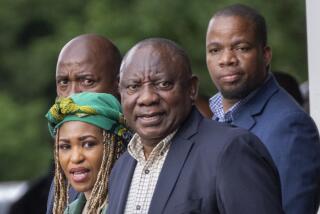Defending Thabo Mbeki
James Kirchick has pounded out several Op-Ed articles on South Africa and Zimbabwe and gotten them published in major newspapers, like “South Africa’s unseemly alliance.”
His claim that the leaders of South Africa’s ruling African National Congress fear the domino effect if Robert Mugabe loses power in Zimbabwe is nothing more than random speculation. I find it absurd.
South Africa’s major problem in dealing with other Africans is that it is perceived, not without cause, to be arrogant and a bit contemptuous. Most South Africans would find the notion that the yokels in Zimbabwe are trendsetters for South Africa to be rolling-on-the-floor hilarious.
Kirchick states that South African President Thabo Mbeki is worried that victory for the opposition in Zimbabwe could embolden his domestic opponents. Mbeki never told him that, nor is there any credible basis to attribute those thoughts to Mbeki.
Most ridiculous of all is Kirchick’s claim that “Mugabe has easily manipulated Mbeki.” Just who is manipulating whom? Most participants and outside observers agree that the Zimbabwean election held on March 29 was a reasonably free and fair opportunity for voters to express their will. A new election law requiring that ballots be counted at each polling station in the presence of representatives of the candidates, and that the results be posted for all to see, was adopted, thus preventing fraud. And a constitutional provision that allowed Zimbabwe’s president to appoint non-elected members to 20% of the seats in parliament, and thereby prevent opponents from ever gaining a majority, was repealed.
The controversies since March 29 have been about the refusal of the Zimbabwean Electoral Commission to release the outcome of the election in a timely fashion. But when the results of the parliamentary election were finally announced, after a recount for which South Africa and other countries in the region sent election observers, they showed that Mugabe’s political opponents had won a majority. The opposition party also claims it won an outright majority in the presidential vote, but the Zimbabwe Election Support Network, an independent observation group, projected that opposition candidate Morgan Tsvangirai failed to win enough votes to avoid a runoff, which will soon take place.
In their emergency meeting on the Zimbabwe situation, Mbeki and the other Southern African leaders invited Zimbabwe’s presidential candidates to speak to their group, the Southern African Development Community, but told Mugabe that he would be received only as one of three candidates, rather than as a fellow head of state. Mugabe refused to attend.
If one pays attention, one can see that Mugabe is in the process of being kicked out and deprived of legitimacy unless he is reelected in an acceptably free and fair election. This is pretty remarkable and reflects some brilliant and sophisticated diplomacy on Mbeki’s part. How well he has succeeded can be seen in the fact that Angolan President Jose Eduardo dos Santos, who seized power a year before Mugabe was first elected and who has been a longtime Mugabe ally, has joined the Southern African Development Community consensus demanding that Mugabe abide by democratic elections. And Dos Santos’ government also recently refused to permit a shipment of Chinese arms destined for Zimbabwe.
Mbeki has long excelled in diplomacy -- he was called on by Africans to head the effort that led to the departure of foreign troops from the Democratic Republic of Congo and to take the lead in Burundi to defuse the threat of a round of Rwandan-style genocide in that country. Not least of all, it was Mbeki who was chosen by the African National Congress to lead negotiations with the apartheid government that resulted in the release of political prisoners, the return of the exiles and the opening of final talks that led to the relatively peaceful “South African miracle” to bring full democracy to his country.
Perhaps with more experience, Kirchick will one day be able to comprehend these successes.
Philip L. Christenson, who has worked on southern African affairs since 1976, was an assistant administrator at USAID under presidents Reagan and George H.W. Bush and served on the senior professional staff for the Senate and House subcommittees on Africa. He has known Mbeki since the late 1970s.
Blowback is an online forum for full-length responses to our articles, editorials and Op-Eds. Click here to read more about Blowback, or submit your own by e-mailing us at opinionla@latimes.com.
More to Read
A cure for the common opinion
Get thought-provoking perspectives with our weekly newsletter.
You may occasionally receive promotional content from the Los Angeles Times.










